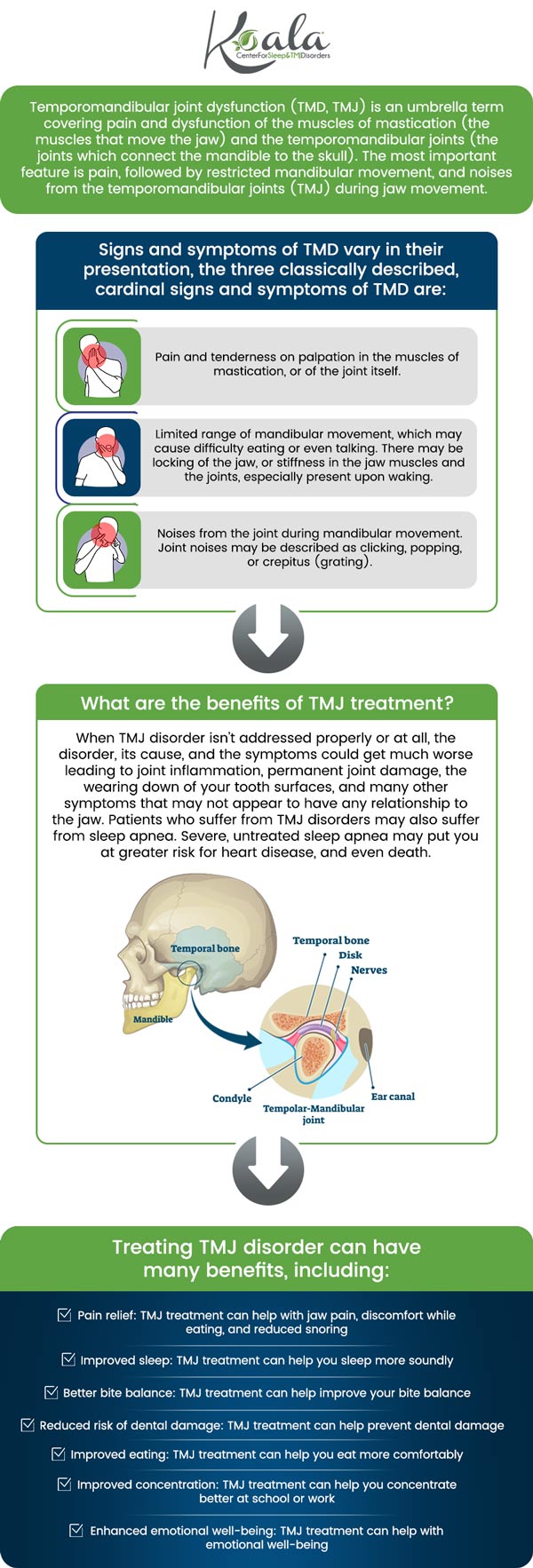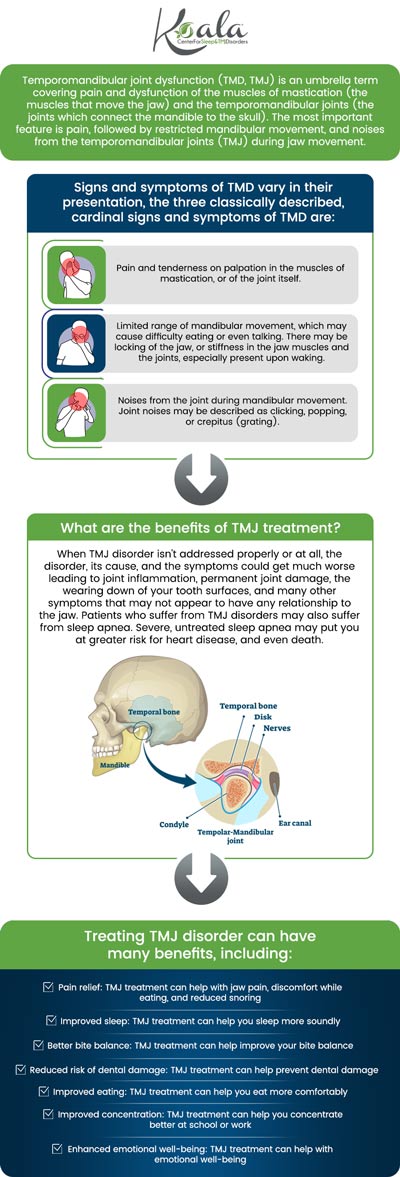What Are TMJ Syndrome Symptoms and Signs?
To learn more about the signs and symptoms of TMJ syndrome, read our below Q and A page or visit Koala® Center For Sleep & TMJ Disorders today. For more information call us at one of our clinics today or request an appointment online. We serve patients from all over the USA. Locations in Bloomington IL, Peoria – Dunlap IL, El Paso TX, and Wausau WI.




Table of Contents:
What is the main cause of TMJ?
What are the symptoms of TMJ?
What will happen if TMJ is not treated?
The temporomandibular joint, or TMJ, refers to the two joints that connect the jaw to the skull. When either of these joints experiences pain or other symptoms, it is known as TMJ syndrome. The signs and symptoms of TMJ syndrome vary from patient to patient, however, they typically include jaw, neck or facial pain, clicking or popping sounds, and headaches. If you are experiencing any of these symptoms, it is important to receive a medical evaluation by a dental professional.
TMJ syndrome has several different causes. In many cases, the actual cause of TMJ syndrome may not be clear. The most common causes of TMJ syndrome include:
– Excessive strain on the jaw joints and the muscle group involved in chewing, swallowing and talking
– Bruxism, which is the habitual, involuntary clenching or grinding of the teeth
– Trauma to the jaw, the neck, or the head
– Arthritis and displacement of the jaw joint disks
– Dislocated jaw or displaced jaw disk
– Degenerative joint disease, including osteoarthritis or rheumatoid arthritis
The most common symptoms of TMJ syndrome include:
– Jaw discomfort or soreness (often in the morning)
– Headaches
– Pain behind the eyes, in the face, shoulder, neck, or back
– Earaches or ringing in the ears
– Clicking or popping of the jaw
– Locking of the jaw
– Limited jaw range of motion
– Clenching or grinding of the teeth
– Dizziness
– Teeth sensitivity, especially without an oral health disease
– Numbness or tingling feeling in the fingers
– A difference in how the upper and lower teeth fit together
Because the symptoms of TMJ syndrome may look like other conditions or health problems, it is important to see a dentist or your healthcare provider for a diagnosis.
If TMJ is left untreated, it can develop into a number of different complications, including:
Chronic Jaw Pain — If TMJ is not treated, the symptoms can worsen, including pain. If it remains untreated for long, the pain can go from mild and occasional to severe and constant.
Joint Damage and Inflammation — Another possible result of leaving TMJ untreated is damage to the joint or joints that were causing issues. If the body cannot properly heal, it will respond with continued inflammation until it is.
Recurring Headaches — Headaches can also worsen from untreated TMJ pain. Because the temporomandibular joint (TMJ) connects the jaw to the skull, and all the muscles surrounding the skull, it can cause headaches. If the source of the problem is not treated, it can increase in frequency and severity.
Development of An Airway Sleep Disorder — TMJ syndrome is often caused by misaligned bites, which negatively impact the quality of sleep. If the jaw is not sitting in its proper place, it can be infringing airflow. As a result, the brain receives less oxygen. Over time, this can lead to the development of an airway sleep disorder, and consequently other symptoms, such as headaches, neck pain, sleep apnea, and brain fog.
If you or someone you love is experiencing signs and symptoms of TMJ syndrome, come to Koala® Center For Sleep & TMJ Disorders for a professional evaluation. We can help you determine what is causing your symptoms and address the underlying problem for long-term relief. Call us today to book an appointment. We look forward to serving you!

Additional Services You May Need
▸ KoalaKIDZzz®
▸ Sleep Apnea
▸ Snoring
▸ TMJ Disorder
▸ Fatigue
▸ Sleep Disorders
▸ Weight Loss
▸ CPAP Alternative
▸ Oral Appliances




